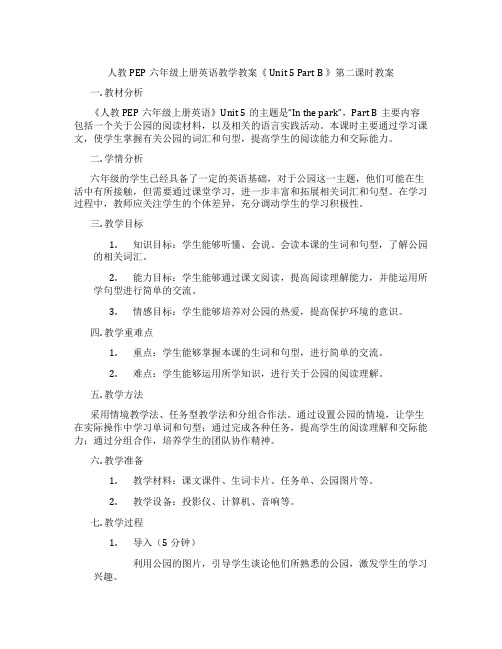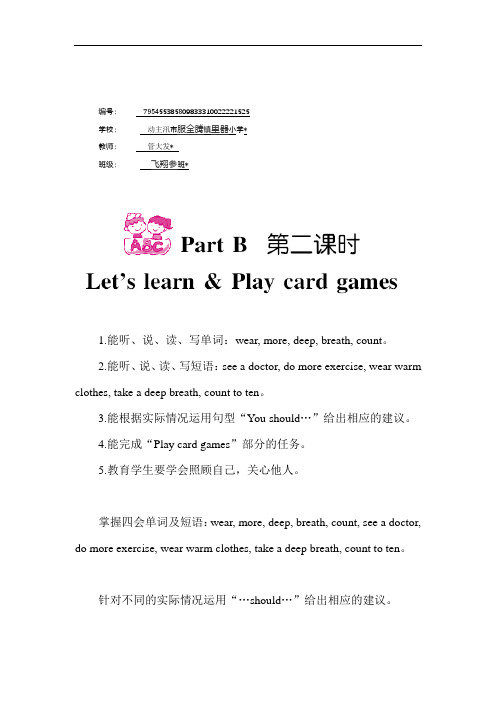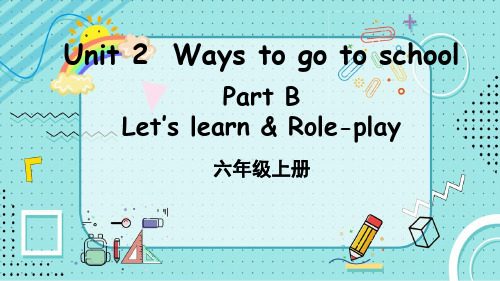六年级英语上册Part B 第二课时 (4)
人教PEP 六年级英语上册 Unit2 Part B (4) Let’s check

2. —How do you ___g_o___ to the cinema? —On foot.
3. —How do you __c_o_m__e_ to work? —By car.
二、用括号内单词的适当形式填空。 1. Jack wants to go to the bookstore. He can get
点拨:根据“If you see this sign, you need to watch out for wildlife (野生动物).”可知,如果你看到这个标志, 你需要注意野生动物,老虎是野生动物,故答案为T。
( F )3. Susan sees the sign "Playground", so she can drive fast.
Crosswalk—This sign means that people can cross the street first. So drivers must stop when they see someone waiting at the crosswalk.
No Right Turn—This sign means you can't turn right, so you have to be careful.
(一)根据短文,
__Y__ie_l_d___ __P_a_r_k_i_n_g__ _N_o__R_i_g_h_t_T_u_r_n__
点拨:根据图片上的 Yield 可得知,此图标意为降速, 但不需要停车。 点拨:根据图片中的P 可得知,此图标意为停车。
点拨:根据图片可得知,此图标意为禁止右转。
人教PEP版六年级英语上册《Unit 3 Part B 第二课时》教学课件优秀公开课

Let’s try & Let’s talkUnit 3 My weekend planPart B人教P E P版英语六年级上册Sing a song:What are you going to do?Warm upCan you guess?Read the words and phrases.visit my grandparents play sports play basketball read books do homework watch TVmake a snowman see a film take a trip...cinemasupermarket school park zoobedroom kitchen ...this afternoon next weektomorrow this morning ...动词地点时间where what when ...疑问词Lead inWhere are you going?What are you going to do?I’m going to ...I’m going to the ...When are you going?Next week/...visit my grandparents play sportsplay basketball read books ... cinema/supermarket school/park …this afternoonnext week/tomorrowthis morning ...Look at the pictures. Who’s he?Let’s tryHe’s John.Who’s she?She’s Amy.John is on his way home. He sees Amy. What is Amy going to do? Guess.She’s going to ...Presentation1. What is Amy going to do?________________________________ 2. Is the ice cream for John?_________________________________She is going to buy some fruit.No, it isn’t.John is on his way home. He sees Amy.Listen and answer.听力原文:John: Amy, where are you going?Amy: I'm going to buy some fruit.John: Nice. I'm going to buy someice cream.Amy: Do you like ice cream?John: No. It's for my cousin, Jack.Let’s talkWatch the video and answer the questions.1. What are John and Jack going to do? They’re going to see a film.2. What film are they going to see?They’re going to see a film about space travel.space travel宇宙旅行1. Where are Jack and John going?They’re going to the cinema.2. When are they going?Next Tuesday.It’s half price.3. Why?2005年6月,中国电影发行放映协会、中国城市影院发展协会、中国电影制片人协会共同发布了“全国影院实行电影票半价日”的倡议。
人教PEP六年级上册英语教学教案《 Unit 5 Part B 》第二课时教案

人教PEP六年级上册英语教学教案《 Unit 5 Part B 》第二课时教案一. 教材分析《人教PEP六年级上册英语》Unit 5的主题是“In the park”,Part B主要内容包括一个关于公园的阅读材料,以及相关的语言实践活动。
本课时主要通过学习课文,使学生掌握有关公园的词汇和句型,提高学生的阅读能力和交际能力。
二. 学情分析六年级的学生已经具备了一定的英语基础,对于公园这一主题,他们可能在生活中有所接触,但需要通过课堂学习,进一步丰富和拓展相关词汇和句型。
在学习过程中,教师应关注学生的个体差异,充分调动学生的学习积极性。
三. 教学目标1.知识目标:学生能够听懂、会说、会读本课的生词和句型,了解公园的相关词汇。
2.能力目标:学生能够通过课文阅读,提高阅读理解能力,并能运用所学句型进行简单的交流。
3.情感目标:学生能够培养对公园的热爱,提高保护环境的意识。
四. 教学重难点1.重点:学生能够掌握本课的生词和句型,进行简单的交流。
2.难点:学生能够运用所学知识,进行关于公园的阅读理解。
五. 教学方法采用情境教学法、任务型教学法和分组合作法。
通过设置公园的情境,让学生在实际操作中学习单词和句型;通过完成各种任务,提高学生的阅读理解和交际能力;通过分组合作,培养学生的团队协作精神。
六. 教学准备1.教学材料:课文课件、生词卡片、任务单、公园图片等。
2.教学设备:投影仪、计算机、音响等。
七. 教学过程1.导入(5分钟)利用公园的图片,引导学生谈论他们所熟悉的公园,激发学生的学习兴趣。
2.呈现(10分钟)通过课件呈现课文内容,让学生初步感知公园的情境。
在呈现过程中,教师引导学生关注课文中的生词和句型。
3.操练(15分钟)学生分组,进行角色扮演,运用所学的生词和句型进行对话。
教师巡回指导,纠正学生的错误,并给予鼓励。
4.巩固(10分钟)学生完成任务单,根据课文内容,回答关于公园的问题。
教师检查答案,给予反馈。
六年级英语上册Part B 第二课时

编号:795455385809833310022221525学校:动主汛市服全腾镇里器小学*教师:管大发*班级:飞翔参班*1.能听、说、读、写单词:wear, more, deep, breath, count。
2.能听、说、读、写短语:see a doctor, do more exercise, wear warm clothes, take a deep breath, count to ten。
3.能根据实际情况运用句型“You should…”给出相应的建议。
4.能完成“Play card games”部分的任务。
5.教育学生要学会照顾自己,关心他人。
掌握四会单词及短语:wear, more, deep, breath, count, see a doctor, do more exercise, wear warm clothes, take a deep breath, count to ten。
针对不同的实际情况运用“…should…”给出相应的建议。
相关图片、课件、教学光盘Step 1:Warm-up1.找几组代表表演“Let’s talk”的对话。
2.老师出示不同的人物表情图,学生二人一组创设情景,运用“Let’s talk”所学重点句型设计对话。
Step 2: Presentation1.教师出示“Let’s learn”中的第一幅挂图,T:How does Sarah feel? Ss: She is ill. T: She should see a doctor.板书“see a doctor”并教读。
2.出示“Let’s learn”中的第二幅挂图,T:How does Wu Yifan feel?Ss: He is worried. T: He should do more exercise.板书“do more exercise”配上肢体语言解释教读。
3.出示一张雪景图。
人教版六年级英语上册unit2 PART B教学课件

green light go at the green light
red light
stop and wait at a red light
Don't go at a red light. You must stop and wait.
yellow light
slow down and stop at a yellow light
Don’t go at a yellow light. You must slow down and stop.
traffic lights
Look at the traffic lights.
traffic rules(规则)
Unit 2 Ways to go to school
人教版六年级英语上册unit 2课堂教学课件
CONTENT
Part B
Let’s learn Role-play Let’s try Let’s talk Practice Read and write Let’s check Let’s wrap it up
我通常/经常/有时候步行/乘……来学校。 3.Don't go at the red light! 别闯红灯! 4.I must pay attention to the traffic lights!
我必须注意交通信号灯!
一、开心三选一。
(
B
)1.Don’t A.by
go_____ the B. at
4. train I go usually by .
__I__us_u_a_l_l_y__g_o__b_y_t_r_a_i_n_.________________
六年级英语上册《Unit 2 Ways to go to school》Part B(第四课时)

✓ Practice the dialogue in roles.
✓ Act out in groups. ✓ Retell the dialogue and
create new dialogues.
Look and do
One puts up the lights one by one. The other does the actions. Then exchange.
Unit 2 Ways to go to school
Part B Let’s learn & Role-play
六年级上册
Let’s sing and do
Stand in a line and do the actions with the music.
Left—left—right—right—go—turn around—go—go—go!
Slow down and stop at a yellow light. Go at a green light.
Stop and wait Slow down and stop at a red light. at a yellow light.
Go at a green light.
Mike: Look! The park is over there! Let’s go!
Traffic lights Red light Yellow light
Green light
We must…
Stop and wait at a red light. Slow down and stop at a yellow light.
Go at a green light.
人教PEP六年级上册英语教学说课稿《Unit4PartB》第二课时说课稿

人教PEP六年级上册英语教学说课稿《 Unit 4 Part B 》第二课时说课稿一. 教材分析人教PEP六年级上册英语教学说课稿《Unit 4 Part B》第二课时说课稿,主要围绕本课时的重要知识点和语言目标展开。
本课时主要介绍一般现在时态的疑问句和回答,以及一般现在时态的被动语态。
通过本课时学习,学生能够掌握一般现在时态的疑问句和回答的构成及用法,理解一般现在时态的被动语态的概念,并能运用所学知识进行实际交流。
二. 学情分析六年级的学生已经具备一定的英语基础,对英语学习有较高的兴趣。
但同时,学生在英语语法知识方面存在差异,部分学生对一般现在时态的疑问句和回答以及被动语态的概念和用法还不够清晰。
因此,在教学过程中,需要关注学生的个体差异,有针对性地进行教学。
三. 说教学目标1.知识目标:–能够理解一般现在时态的疑问句和回答的构成及用法。
–能够理解一般现在时态的被动语态的概念,并能运用所学知识进行实际交流。
2.能力目标:–能够听懂、会说、会读一般现在时态的疑问句和回答。
–能够听懂、会说、会读一般现在时态的被动语态。
3.情感目标:–激发学生对英语学习的兴趣,培养积极的学习态度。
–培养学生的团队协作精神,提高课堂参与度。
四. 说教学重难点1.教学重点:–一般现在时态的疑问句和回答的构成及用法。
–一般现在时态的被动语态的构成及用法。
2.教学难点:–一般现在时态的疑问句和回答的运用。
–一般现在时态的被动语态的运用。
五. 说教学方法与手段1.教学方法:–任务型教学法:通过完成各种任务,让学生在实践中掌握一般现在时态的疑问句和回答以及被动语态的用法。
–情境教学法:创设各种情境,让学生在真实的环境中感受和运用一般现在时态的疑问句和回答以及被动语态。
2.教学手段:–多媒体教学:利用课件、视频等资源,为学生提供丰富的学习材料。
–小组讨论:引导学生进行小组讨论,提高学生的参与度和团队合作能力。
六. 说教学过程•通过复习上一课时学的一般现在时态的肯定句和否定句,引导学生进入本课时的学习。
人教PEP 六年级英语上册 Unit4 Part B (2) Let’s learn

She is a homemaker. She often cleans our house at home. She likes cooking and shopping. And she cooks very well.
Her favourite season is spring. She often flies kites with my dad and me in spring.
Mother’s Day is coming! I’m going to make a card for her and tell her I love her.
My mum is the most beautiful mother in the world.
任务一:根据短文内容,完成卡片。
Name: 1.___X_i_a_o_li__ Living place (居住地): 2. _S_h_a_n_g_h_a_i__ Languages (语言): 3. _C_h_i_n_e_s_e_a_n_d__E_n_g_l_is_h_ Hobbies: 4. c_o_o_k_i_n_g__a_n_d_s_h_o_p_p_i_n_g___
—Yes, he does. 1. —_D__o_es__sh__e_d_o__w_o_r_d__p_u_z_zl_e_s_o_n__th__e_w_e_e_k_e_n_d_?_
—_Y_e_s_,_s_h_e_d_o_e_s_.____________________
点拨:此题作答前先观察图片,图意分别为做填字游戏(do word puzzles)、看电视(watch TV)、杭州。然后根据图片提示 语仿照例句写对话。
and he __st_u_d_i_e_s_ __C_h_i_n_e_se__ every day.
- 1、下载文档前请自行甄别文档内容的完整性,平台不提供额外的编辑、内容补充、找答案等附加服务。
- 2、"仅部分预览"的文档,不可在线预览部分如存在完整性等问题,可反馈申请退款(可完整预览的文档不适用该条件!)。
- 3、如文档侵犯您的权益,请联系客服反馈,我们会尽快为您处理(人工客服工作时间:9:00-18:30)。
作品编号:578912354698310.2567
学校:否法结市环节镇应对小学*
教师:避微略*
班级:蜻蜓壹班*
1.能听、说、读、写单词或词组dictionary, comic book, word book, postcard。
2.能听、说、读、写句子:Where are we going? To the bookstore. I
m going to buy a new comic book.并能进行关键词的替换练习。
3.能够运用所学知识完成角色扮演。
4.培养学生综合运用语言的能力。
听、说、读、写四会单词和短语。
在真实情景中灵活运用所学知识。
单词卡片、教学光盘、教学挂图、字典、单词书、明信片、漫画书
Step 1:Warm-up
1.出示不同的地点和时间,同桌二人之间互相对话操练句型。
eg: S1:Where are you going? S2: I’m going to the bookstore.
S1: When are you going? S2: I’m going next week.
2.拿出上一课时所做的report,并在全班内进行汇报交流。
Step 2: Presentation
1.根据上一课时所学情况,情景导入,设置问题,引入所学。
After John and his cousin seeing the film, where are they going?
A. bookstore
B. school
C. supermarket
然后播放“Let’s learn”部分的听力,让学生带着问题去听,并核对答案。
2.再次播放“Let’s learn”部分并思考:What is John going to buy?
引出“comic book”,拿出漫画书实物,并板书。
3.教师拿出单词书,并说:I’m going to buy a word book,板书并教读,可先教“word”,再结合“word book”;也可对比“comic book”教。
4.教师出示明信片,并问:What’s this? 学生可能摇头不知,教师板书:postcard,并问如果有不认识的单词,可以借助什么工具?学生会说:字典,板书:dictionary。
注意dictionary单词较长,教师可
采用分解法教读dictionary,并开火车听学生发音纠正。
5.同桌二人利用不同的单词或短语进行对话替换练习,巩固短语及句子。
Step 3: Consolidation and extension
1.完成“Role play”部分的任务。
首先播放教学光盘,“Zhang Peng, Sarah and Amy are going to the bookstore. John is the shop assistant. What are they talking?”让学生听,并回答:What is Zhang Peng going to buy? What is Sarah going to buy?
2.分组操练口语,其中一人为shop assistant,可以销售各种类型的书,运用句型:What are you going to buy? I’m going to buy …。
3.课堂小练习:对划线部分提问。
(1)I’m going to buy a pen.
What are you going to do?
(2)I’m going to the museum.
Where are you going?
(3)Sarah is going to buy some books.
What is Sarah going to do?
Step 4:Homework
抄写本课时的四会单词。
本课时要求能够灵活运用句子:Where are we going? To the bookstore. I’m going to buy ….。
结合上一课时John and Jack一起看电影的情景设置,直接导入对话,并根据对话引出新单词短语“comic book”。
接着采用直观实物教学法来指导学生记忆单词。
将单词融合到句子的学习中去。
最后巩固扩展,让学生模拟生活场景,让英语走进生活,用英语来解决实际问题。
